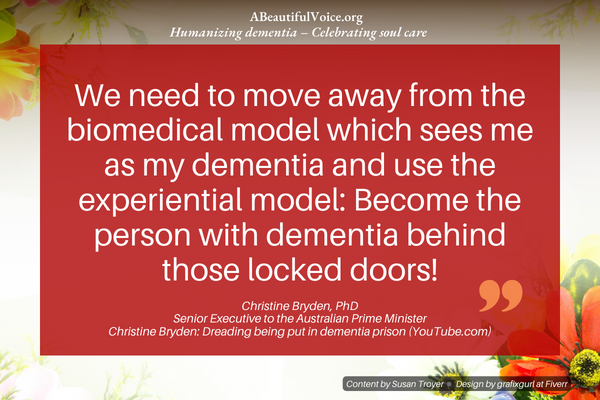In the evolving landscape of healthcare, particularly in the domain of dementia care, the introduction of the Experiential Model marks a revolutionary shift in our approach to caregiving. This piece draws inspiration from the insights of Christine Bryden, a formidable advocate for dementia care reform. In this YouTube, she shares her inspiring personal journey from being a high-level government advisor to the prime ministers in Australia – to becoming a voice for individuals with dementia.
Her story illuminates the path toward more empathetic and effective care practices.
The significance of the Experiential Model in Contemporary Care
At the heart of the Experiential Model lies a fundamental premise, vividly captured by Christine Bryden’s experiences and advocacy.
Her advocacy is about understanding and empathy over mere treatment! This model champions a care approach that prioritizes walking in the shoes of those with dementia, contrasting sharply with the conventional Biomedical Model. The Biomedical Model often confines care to medication and institutional settings – what Bryden metaphorically critiques as “dementia prison.”
Embracing the Experiential Model entails a transition from static, impersonal care structures to dynamic, person-centered care frameworks.
Cultivating a Holistic Approach in Dementia Care
In the intricate world of dementia, where individuals navigate complex and multifaceted challenges, fostering a caring environment that values personal experiences and individual needs is crucial. By advocating for a model where empathy and personal connection guide care, healthcare professionals can transcend traditional barriers, offering a more nuanced and compassionate response to dementia.
The Power of Understanding and Personal Connection
The ethos of the Experiential Model aligns with the wisdom of embracing humility and curiosity in care—a balance that fosters continuous learning and collaboration. Recognizing the limitations of one’s knowledge and remaining open to the lived experiences of those with dementia can transform care practices. This approach not only enriches the caregiver’s understanding but also significantly enhances the quality of life for those receiving care.
Embracing a Future of Empathetic Care
Adopting the Experiential Model in dementia care invites us to reimagine our practices, prioritizing empathy, personal connection, and a deep understanding of the individual’s experience. As we embark on this journey, we are called to challenge old paradigms and embrace a future where care is defined by compassion, respect, and an unwavering commitment to recognizing the humanity in each individual with dementia. Let us step into this future together, guided by the principles of the Experiential Model, to forge a path of care that truly resonates with the needs and experiences of those we aim to serve.
YouTube – Christine Bryden: Dreading being put in dementia prison – (28 min)
Blog Author:

Zulekha Ali (“Zuley”) is a freelance writer with a commitment to delivering informative and impactful content to enrich readers’ understanding and empower them to make informed decisions.
Blog Co-Author:

Susan Troyer, MS, BA, is author and curator of ABeautifulVoice.org.
Member:



Leave A Comment